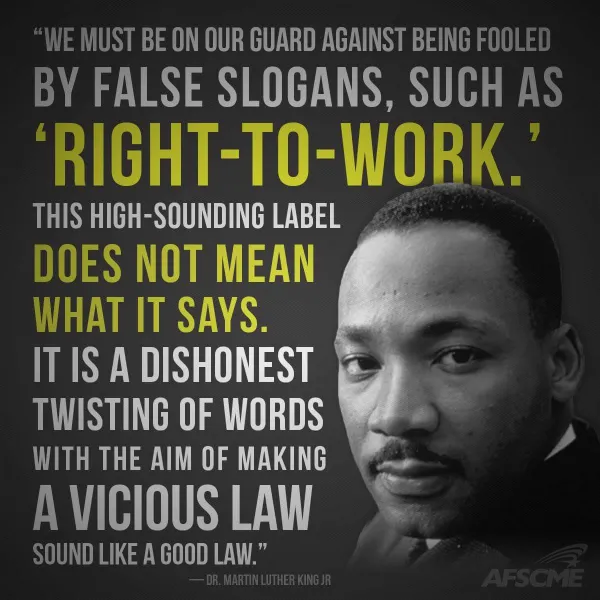A union in the workplace provides a voice for employees. Do you know the history behind our education unions?
Unions empower workers by uniting people with common goals. When people advocate as one, they are more powerful and can accomplish more than as individuals. More working people than ever—some 57 million—say they would join a union if they had a chance, according to a survey from Peter D. Hart Research Associates. While union numbers have diminshed over the years, recent union attacks have also proven most Americans oppose weakening unions and collective bargaining.
 Employees shall have the right form…labor organizations [and] to bargain collectively…. National Labor Relations Act, 1935
Employees shall have the right form…labor organizations [and] to bargain collectively…. National Labor Relations Act, 1935
The labor movement was the principal force that transformed misery and despair into hope and progress. Those who would destroy or further limit the rights of organized labor…do a disservice to the cause of democracy.
Dr. Martin Luther King, Jr.
A union in the workplace can provide many benefits:
- Respect on the job
- Better wages and benefits
- Flexibility for work and family needs
- A counterbalance to the unchecked power of employers
- A voice in improving the quality of their products and services
Why join? Here are a few reasons why teachers and education staff professionals (ESPs) have joined the FEA.
- A Voice on the Job. Union workers have the right to negotiate with their employer over wages, hours, benefits and working conditions. Without a union, management makes all the decisions alone. Without collective bargaining, Florida teachers and education staff professionals (ESPs) would have no legal rights at all under the state's "right to work" labor laws.
- Strength in Numbers. Union workers negotiate and organize for improvements as a unified group instead of as individuals. When we work together, this collective force translates into more power and a better chance of getting our voices heard.
- A Legally Binding Written Contract. Union workers have a contract that defines and guarantees the terms of our employment. The members of the union negotiate their contract with management. With help from union staff, we decide what gets proposed, elect our own bargaining team, negotiate the contract and vote to approve the contract.
- Protection and Support. Union workers need the assurance that our workplace rights, including health and safety conditions, are being upheld and monitored and ensure the ability to challenge any unfair or questionable decisions or actions.
- Respect. Union workers join, not because we’re against our employer, but because we want to improve our jobs by joining with co-workers to gain greater respect and control over our worksite and employment.
Read About the Union Difference
Today, thousands of workers want to join unions. The wisest employers understand that when workers form unions, their companies also benefit. But most employers fight workers’ efforts to come together by intimidating, harassing and threatening them. In response, workers are reaching out to their communities for help exercising their freedom to improve their lives.
Studies show that states in which more people are union members are states with higher wages, better benefits and better schools. While unions are just one of the factors that affect the quality of living, the pattern indicates that when workers have a voice, everyone in the community benefits—not just union members.
Unions and the Fight for Justice
Looking for a Living Wage?
Get the Facts on Collective Bargaining
Get Hands-on Training for Today's Labor Movement: Let the National Labor College Help You
America’s Union Suppression Movement (And Its Apologists), Part One
America’s Union Suppression Movement (And Its Apologists), Part Two

